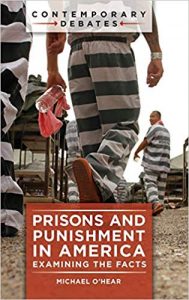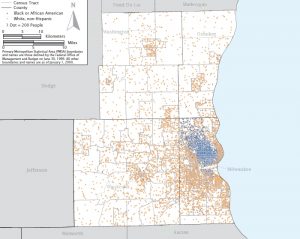This semester in Professor Lisa Mazzie’s Advanced Legal Writing: Writing for Law Practice seminar, students are required to write one blog post on a law- or law school-related topic of their choice. Writing blog posts as a lawyer is a great way to practice writing skills, and to do so in a way that allows the writer a little more freedom to showcase his or her own voice, and—eventually for these students—a great way to maintain visibility as a legal professional. Here is one of those blog posts, this one written by 3L Andrea Jahimiak.
On February 22, 2017, six individuals who identify as either Black or Latino filed a class‑action lawsuit against the City of Milwaukee, the Milwaukee Fire and Police Commission (“FPC”), and Police Chief Edward Flynn. The plaintiffs allege that their constitutional rights were violated when they were unlawfully stopped, frisked, or both, by Milwaukee Police Department (“MPD”) officers.
Together, the plaintiffs are seeking relief by way of the court: (1) declaring that the defendants’ stop and frisk policies, practices, and customs are unconstitutional; and, (2) ordering immediate and permanent suspension of such policies, practices, and customs.
Allegation of a Named Plaintiff
One of the plaintiffs alleged that her teenage son has been unlawfully stopped by an MPD officer on at least three occasions. The first unlawful stop took place when he was ten years old.
Around noon in October 2010, D.A. walked to his friend’s home. When D.A. arrived at his friend’s home, he rang the doorbell, but no one answered. D.A. then used his cellphone to call his friend.
While on the phone, an MPD officer walked up to D.A., put his arms around D.A. shoulder’s and walked D.A. to his squad car located in the nearby alley. The officer then forcibly removed D.A.’s phone from him, patted him down, and made D.A. put his hands on the hood of the squad car.
The father of D.A.’s friend, a white male, ran out of the home. The father immediately asked the officer what was going on and asked why he was searching a child. The officer replied that he was making sure nothing was wrong. The officer then left.
D.A.’s mother called the associated MPD district and spoke to the sergeant. D.A.’s mother demanded to know why a police officer stopped and frisked her ten-year-old son. The sergeant said that it was MPD policy to stop and frisk young men walking through alleys.
Expert Reports Confirming MPD
Almost a year after filing suit, the ACLU of Wisconsin released three expert reports regarding the MPD’s stop and frisk policies, practices, and customs. The expert reports were conducted in relation to the ongoing class‑action lawsuit.
The expert reports concluded that the MPD has unconstitutional policies, practices, and customs. And that MPD officers routinely conduct unconstitutional stops and frisks procedures, motivated by race and ethnicity.
 I am pleased to report that my latest book, Prisons and Punishment in America: Examining the Facts, is now in print. Structured as a series of questions and answers, the book synthesizes the law and social science on sentencing, corrections, and prisoner reentry. Individual chapters cover:
I am pleased to report that my latest book, Prisons and Punishment in America: Examining the Facts, is now in print. Structured as a series of questions and answers, the book synthesizes the law and social science on sentencing, corrections, and prisoner reentry. Individual chapters cover:
